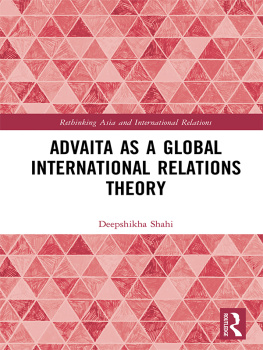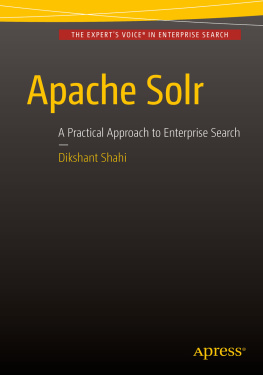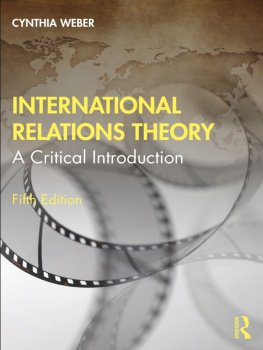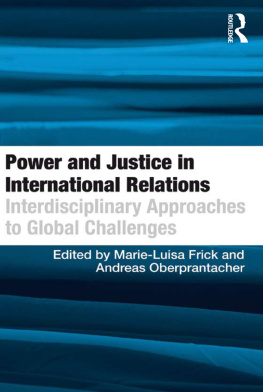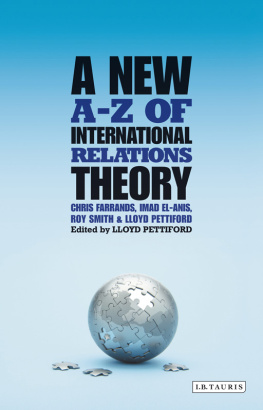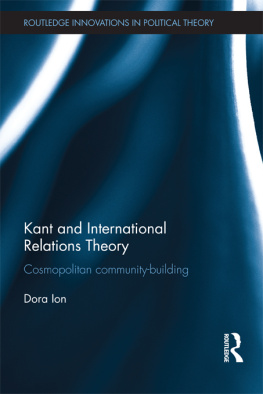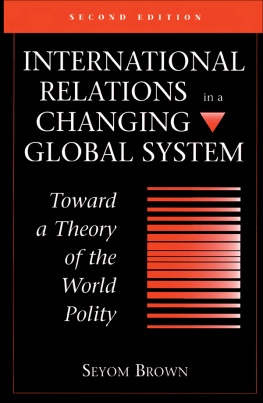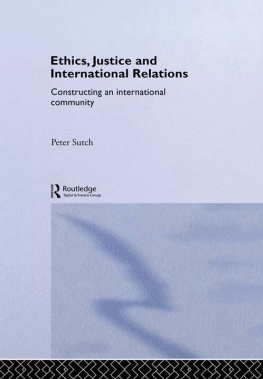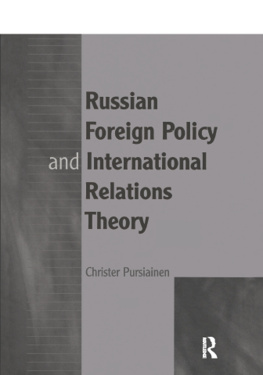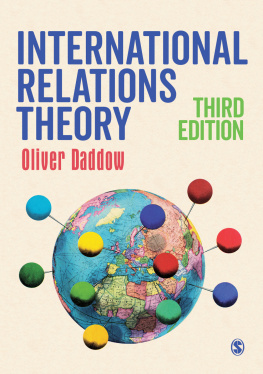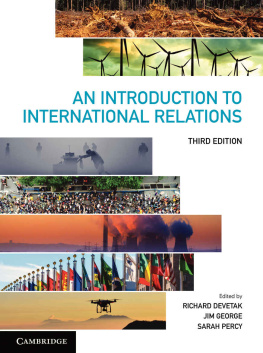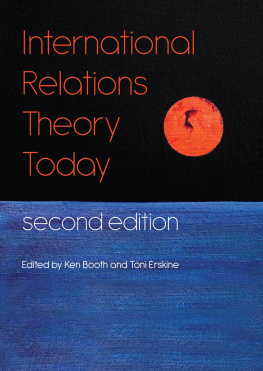Shahi - Advaita As a Global International Relations Theory
Here you can read online Shahi - Advaita As a Global International Relations Theory full text of the book (entire story) in english for free. Download pdf and epub, get meaning, cover and reviews about this ebook. City: London;New York, year: 2019, publisher: Taylor & Francis (CAM), genre: Religion. Description of the work, (preface) as well as reviews are available. Best literature library LitArk.com created for fans of good reading and offers a wide selection of genres:
Romance novel
Science fiction
Adventure
Detective
Science
History
Home and family
Prose
Art
Politics
Computer
Non-fiction
Religion
Business
Children
Humor
Choose a favorite category and find really read worthwhile books. Enjoy immersion in the world of imagination, feel the emotions of the characters or learn something new for yourself, make an fascinating discovery.
- Book:Advaita As a Global International Relations Theory
- Author:
- Publisher:Taylor & Francis (CAM)
- Genre:
- Year:2019
- City:London;New York
- Rating:3 / 5
- Favourites:Add to favourites
- Your mark:
- 60
- 1
- 2
- 3
- 4
- 5
Advaita As a Global International Relations Theory: summary, description and annotation
We offer to read an annotation, description, summary or preface (depends on what the author of the book "Advaita As a Global International Relations Theory" wrote himself). If you haven't found the necessary information about the book — write in the comments, we will try to find it.
Shahi: author's other books
Who wrote Advaita As a Global International Relations Theory? Find out the surname, the name of the author of the book and a list of all author's works by series.
Advaita As a Global International Relations Theory — read online for free the complete book (whole text) full work
Below is the text of the book, divided by pages. System saving the place of the last page read, allows you to conveniently read the book "Advaita As a Global International Relations Theory" online for free, without having to search again every time where you left off. Put a bookmark, and you can go to the page where you finished reading at any time.
Font size:
Interval:
Bookmark:

The academic discipline of International Relations strives to attain a global spirit to narrow the cognitive gaps between the West and the Rest. On the one hand, there is the hegemonic presence of mainstream universalist Eurocentric IR theories, and on the other the counter-hegemonic presence of particularist Post-colonial and De-colonial non-Eurocentric IR theories. Nevertheless, both theoretical traditions endorse epistemological dualism that essentially separates the theorizing-subject from the theorized-object; thereby failing to bridge the gaps.
This book uses the monist schema of subject-object merger in the ancient Indian philosophy of Advaita to inaugurate a Global IR theory. In the global theoretical schema of Advaitic monism, the apparent particularist reality is supplemented (not contradicted) with the hidden universalist reality the net result of which is a reconciliation of dualism with monism at the theoreticalpractical level. The possibilities of this reconciliation have not been estimated at either level and as such, this untapped intellectual strategy stands to enrich both Eurocentric IR and non-Eurocentric IR. Shahi establishes Advaita as an alternative epistemological-methodological tool to re-imagine the complex realities of contemporary international politics.
This fully fledged Global International Relations Theory will appeal to students of international relations, political theory, administrative theory and philosophy.
Deepshikha Shahi is Assistant Professor of Political Science at the University of Delhi, India. Recently she was a Post-doctoral Fellow at the Centre for Global Cooperation Research (Kte Hamburger-Kolleg), University of Duisburg-Essen, Germany. She has also been a Research Affiliate with International Democracy Watch (Italy), Transnational Institute (Netherlands), Torino World Affairs Institute (Italy), Institute of International Affairs (Italy), and Institute for Defence Studies and Analyses (India). She had earlier worked as a technical proposal writer for the Society of Afghan Women in Engineering and Construction (Afghanistan).
Rethinking Asia and International Relations
Series Editor Emilian Kavalski, Australian Catholic University (Sydney)
This series seeks to provide thoughtful consideration both of the growing prominence of Asian actors on the global stage and the changes in the study and practice of world affairs that they provoke. It intends to offer a comprehensive parallel assessment of the full spectrum of Asian states, organisations, and regions and their impact on the dynamics of global politics.
The series seeks to encourage conversation on:
what rules, norms, and strategic cultures are likely to dominate international life in the Asian Century;
how will global problems be reframed and addressed by a rising Asia;
which institutions, actors, and states are likely to provide leadership during such shifts to the East;
whether there is something distinctly Asian about the emerging patterns of global politics.
Such comprehensive engagement not only aims to offer a critical assessment of the actual and prospective roles of Asian actors, but also seeks to rethink the concepts, practices, and frameworks of analysis of world politics.
This series invites proposals for interdisciplinary research monographs undertaking comparative studies of Asian actors and their impact on the current patterns and likely future trajectories of international relations. Furthermore, it offers a platform for pioneering explorations of the ongoing transformations in global politics as a result of Asias increasing centrality to the patterns and practices of world affairs.
For more information about this series, please visit: https://www.routledge.com/Rethinking-Asia-and-International-Relations/book-series/ASHSER1384
Recent titles
Advaita as a Global International Relations Theory
Deepshikha Shahi
Chinas Great Power Responsibility for Climate Change
Sanna Kopra
Advaita as a Global International Relations Theory
Deepshikha Shahi

First published 2019
by Routledge
2 Park Square, Milton Park, Abingdon, Oxon OX14 4RN
and by Routledge
711 Third Avenue, New York, NY 10017
Routledge is an imprint of the Taylor & Francis Group, an informa business
2019 Deepshikha Shahi
The right of Deepshikha Shahi to be identified as author of this work has been asserted by her in accordance with sections 77 and 78 of the Copyright, Designs and Patents Act 1988.
All rights reserved. No part of this book may be reprinted or reproduced or utilised in any form or by any electronic, mechanical, or other means, now known or hereafter invented, including photocopying and recording, or in any information storage or retrieval system, without permission in writing from the publishers.
Trademark notice: Product or corporate names may be trademarks or registered trademarks, and are used only for identification and explanation without intent to infringe.
British Library Cataloguing-in-Publication Data
A catalogue record for this book is available from the British Library
Library of Congress Cataloging-in-Publication Data
Names: Shahi, Deepshikha, author.
Title: Advaita as a global international relations / Deepshikha Shahi.
Description: Abingdon, Oxon ; New York, NY : Routledge, 2019. |
Series: Rethinking Asia and international relations | Includes bibliographical references and index.
Identifiers: LCCN 2018012904| ISBN 9781138497740 (hardback) | ISBN 9781351018036 (e-book)
Subjects: LCSH: International relationsPhilosophy. | Advaita.
Classification: LCC JZ1305 .S4825 2019 | DDC 327.101--dc23
LC record available at https://lccn.loc.gov/2018012904
ISBN: 9781138497740 (hbk)
ISBN: 9781351018036 (ebk)
For one and many Rupu
At times, the stimulus behind a creative pursuit is nothing but a pure mystery. I am beholden to that stimulus which in due course has metamorphosed into this book. A precursor to this book emerged as a published article in the European Journal of International Relations (EJIR) in 2016. I salute the rare ingenuity of Beate Jahn the then editor-in-chief of EJIR who promoted my outlandish endeavor to introduce the ancient Indian philosophy of Advaita to the contemporary academic field of International Relations theory. I am also grateful to Gennaro Ascione who proposed to coauthor that article with me and added his vivacities in ascertaining the probable outcomes of the encounters between Advaita and International Relations theory. The unanticipated commendation won by that preparatory article prompted the urge to further take on an in-depth exploration of this relatively alien theme. Despite its intensity, the urge could not take a concrete shape without the unforeseen backing from Rainer Baumann who pre-arranged a space for research on Advaita and International Relations theory at the Kte Hamburger Kolleg (KHK) /Centre for Global Cooperation Research, University of Duisburg-Essen, Germany. As a research initiative at KHK, the book benefitted from not only the incomparable infrastructural support, but also the outstanding intellectual inputs from a truly Global team of researchers: I extend special thankfulness to Rainer Baumann, Markus Bckenfrde, Tobias Debiel, Katja Freistein, Frank Gadinger, Gunther Hellmann, Ayse Cavdar, Pablo Holmes, Eric Grynaviski, Pol Bargus-Pedreny, Stephen Adaawen, Charmaine Misalucha-Willoughby, Ariel Hernndez, Martin Wolf, Christine Unrau and Liam Swiss. Apart from these researchers, I have been privileged to sporadically share my thinking with a few brilliant Indologists and IR scholars in India and abroad: I am highly obliged for the censures and approvals received from Patrick Olivelle, Amitav Acharya, L. H. M. Ling, Emilian Kavalski, Achin Vanaik, Navnita Chadha Behera, Siddharth Mallavarapu, Jayashree Vivekanandan, Varun Sahni, A. K. Ramakrishnan, Jayati Srivastava, Pradeep Kumar Gautam and Saurabh Mishra. My inmost appreciation goes to my parents Mrigendra Kumar Shahi and Prema Shahi for unshakably believing in my aptitudes. And my solemn indebtedness goes to my husband Dhiraj for unconditionally boosting me through all my undertakings. Nevertheless, I am at a loss for words when it comes to express the inexplicable gratitude I feel toward my brother Rupu as he persistently flourishes as an eternal freewill player (
Font size:
Interval:
Bookmark:
Similar books «Advaita As a Global International Relations Theory»
Look at similar books to Advaita As a Global International Relations Theory. We have selected literature similar in name and meaning in the hope of providing readers with more options to find new, interesting, not yet read works.
Discussion, reviews of the book Advaita As a Global International Relations Theory and just readers' own opinions. Leave your comments, write what you think about the work, its meaning or the main characters. Specify what exactly you liked and what you didn't like, and why you think so.

